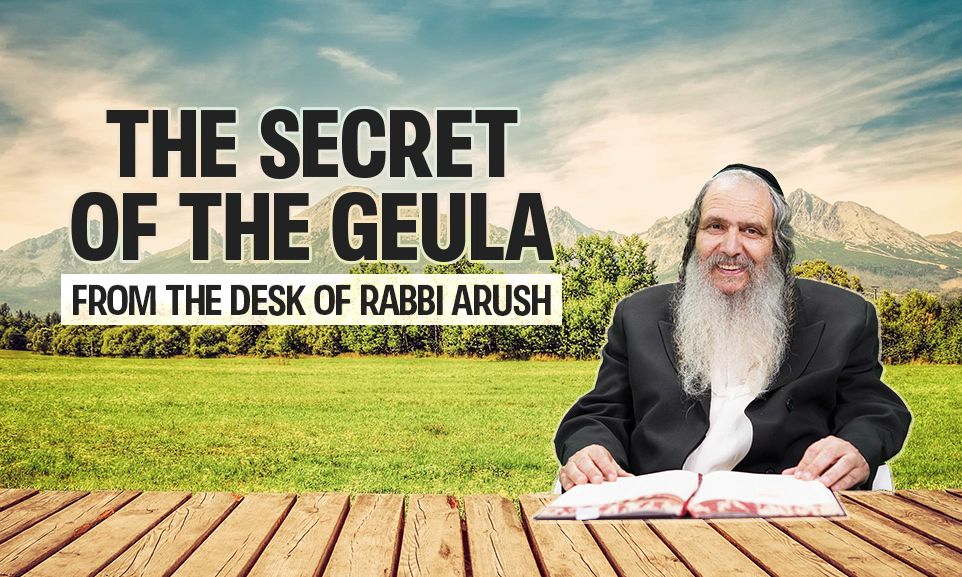
The Secret of the Geula
Hashem loves the Jewish people like a father who loves his son simply because he is his son, and not because of the son's deeds. Rabbi Arush explains how we all can merit such a relationship with Hashem.

Translated from Rabbi Arush’s feature article in the weekly Chut shel Chessed newsletter. The articles focus on his main message: “Loving others as yourself” and emuna.
Teamwork
The tzaddik Rabbi David of Lelov1 was once late in praying Shacharit (the morning prayers). One of the Mitnagdim (those who opposed Chassidism) came into his shul and saw him standing with his tallit (prayer shawl) on his shoulder, preparing himself for prayer. The mitnaged despised the tzaddik in his heart for praying so late in the day. He turned to Rabbi David and said to him with open disdain: “Honorable Rabbi, I, who am not a great person, rose some hours ago, and managed to have a dip in the mikvah and to learn Torah for a good few hours, while you, the famous rabbi, have only now opened your eyes…”
The tzaddik replied calmly: “Look, Reb Jew, if you said before your Torah, prayer and mitzvot the words ‘in the name of all Yisrael’, then I too was a full partner in your prayers and Torah study, so you have no advantage over me, and what are you so proud of? But if you didn’t say, ‘in the name of all Yisrael’, who needs your Torah?…”
The tzaddik’s answer was not meant as a snide comment, chalila; rather it contained a deep and profound lesson:
A mitzvah of an individual has no value if it is not connected to and shared with all Jews!
Torah and mitzvot are not competitive; rather, they are “teamwork” on the part of all Jews, performed for their Father in Heaven.
The Rashbam’s Legacy
The tzaddikim say that there are two types of relationship between Yisrael and Hashem. One is conditional love, in which Hashem reveals His love to the Jewish people according to their deeds. If the Jews behave properly, they receive abundance. And if, chalila, they don’t – then not. “Your deeds will bring you close and your deeds will distance you,” as the saying goes.
But there is a higher level of relationship, in which Hashem yitbarach sends down and does good and reveals His love to the Jewish people for no reason at all, only from His love for them as a Father Who loves His son; no bad deed can ruin this love, and this unconditional love is called “because He wanted me” (Psalm 91:14) – Hashem wants us; Hashem desires the Jewish People Himself like a father loves his son because he is His son, and not because of his deeds.
On the day he left this world, the Rashbam said to his disciple: If you wish to merit the relationship of “because He wanted me”, I’ll tell you the secret of how to merit it: Before doing any mitzvah, be it tzedaka, prayer or learning Torah, say the words: “I am doing this mitzvah in the name of all Yisrael.”
From this story, too, we see that there is an essential difference between a mitzvah that an individual performs as an individual, and a mitzvah that a Jew performs in partnership with the rest of the Jewish people. When you are doing it jointly with all Jews – the entire system by which the Creator of the World interacts with the Jewish People changes!
For, as we mentioned, Torah and mitzvot are not competitive. Torah and the mitzvot are the mission of the entire Jewish People as one nation. The value of everything we do is based on its being sent up to Heaven by the entire Jewish People! Hashem gets pleasure from the joint efforts of all Jews. When we share and give all Jews the merit of our service of Hashem, then the Torah and mitzvot belong to the entire Jewish People and that’s what gives value to our Torah and mitzvot – and nachat ruach (pleasure) to Hashem.
One Man, One Heart
That is the only explanation that can allow us to understand Moshe Rabbeinu’s mesirut nefesh (self-sacrifice) for the Jews in our parasha (see Likutei Moharan II, 82:3). Hashem wanted to kill all Jews and leave only Moshe (Shemot 32: 9-10). This was seemingly the correct thing, because all the Jews participated in the Sin of the Golden Calf, and only Moshe managed to remain righteous. If so, it was right that Moshe should continue the Jewish People alone; but Moshe insisted, argued and fought for the people and was willing to have his name erased by Hashem for their sake. What is the meaning of this struggle of Moshe?
But now we understand. Hashem wanted to destroy the Jews according to the system of conditional love, in which Hashem behaves towards Jews according to their deeds; but Moshe Rabbeinu revealed that the Jews were not only separate individuals who were doing mitzvot, but rather they were one nation and one unit and one body, in which every component was and is connected with all others – and so Moshe revealed the way of “because He wanted me.” And only then did Hashem forgive them for the terrible sin and void the decree!
This shows us how much Moshe lived his deep connection with each and every Jew. He felt that there was no meaning to anything he did if it was not connected to the entire Jewish nation. If so, what good would his living do, if the Jewish people wouldn’t exist? And if Hashem wants me, He wants all Jews, for they are all partners in everything I do.
There is no “in the name of all Yisrael” greater than that.
And what are the results of Moshe’s mesirut nefesh? In the merit of that mesirut nefesh, Hashem’s mercy was revealed, the willingness to be patient with the righteous as well as with the wicked.
Before Moshe Rabbeinu expressed his willingness to sacrifice himself for the Jews, Hashem said: “Whoever has sinned to Me, I will wipe him from My book.” (Shemot 32: 33) The sinner must pay; the sinning soul should die.
But after Moshe Rabbeinu was willing to sacrifice himself and prayed day and night and was not willing to give in, as it were, to Hashem, what happened immediately? The thirteen middot rachamim (attributes of mercy) were revealed to him (Shemot 34:6-7), which include erech apayim – patience. And the midrash adds: patience for the wicked as well, which is the way of love and mercy, independent of a person’s deeds, “because He wanted me” – this is the root of forgiveness.
In Those Days, At This Time
In our days we see that the Jewish People is in great danger, so we should emphasize the sharing and unity with all Jews. We don’t serve Hashem for ourselves! Judaism is not a “personal career”. Judaism is a national mission for us, as Hashem’s nation. All our mitzvot and Torah are done in total partnership with the soldiers who are willing to give their lives for us, and with every Jew in any place in Israel or abroad.
And that also obligates us much more! Because every mitzvah of yours and every prayer, and every bit of Torah study is in the name of all Jews and influences all of them, and on Hashem’s relationship with us and the revelation of His love and providence. If so, you should make sure to add strength and merits to all Jews and feel a closeness and a sense of belonging and union with every Jew.
And if, unfortunately, we do not have Moshe Rabbeinu’s mesirut nefesh – he was literally willing to give up his life – at least we can adopt the holy habit that we have brought in the name of the tzaddikim, to say about everything “in the name of all Yisrael”. To think and intend that your deed will be as if all Jews did this mitzvah, and to feel that everything we do is in full partnership with every Jew and for the merit of all Jews.
I have also learned from my teachers to say before any holy act: “I am doing this mitzvah in order to bring joy to my Creator, yitbarach shemo (may His name be blessed).” This is an announcement that we want our mitzvot to be for the sake of His name alone, and not for the sake of any interest or desire to receive a reward for them.
And so, how about combining these two sayings and saying them out loud before performing any mitzvah, while trying to think and have the intention in your heart as well:
“Everything I will do is in the name of all Yisrael and in order to bring joy to my Creator, yitbarach shemo.”
And in this merit, we will experience the relationship of “because He wanted me”, that Hashem should once again want us and forgive all our sins and bring us to complete teshuva, and our eyes will witness His return to Tzion with mercy.
1Rabbi Dovid was known for his extraordinary ahavat Yisrael. It was said of him that he was incapable of seeing faults in a fellow Jew. Two printed collections of stories about him are Migdal David (M. Brakman, 1930) and Peri Kodesh Hillulim (M.Y. Weinstock, 1961).




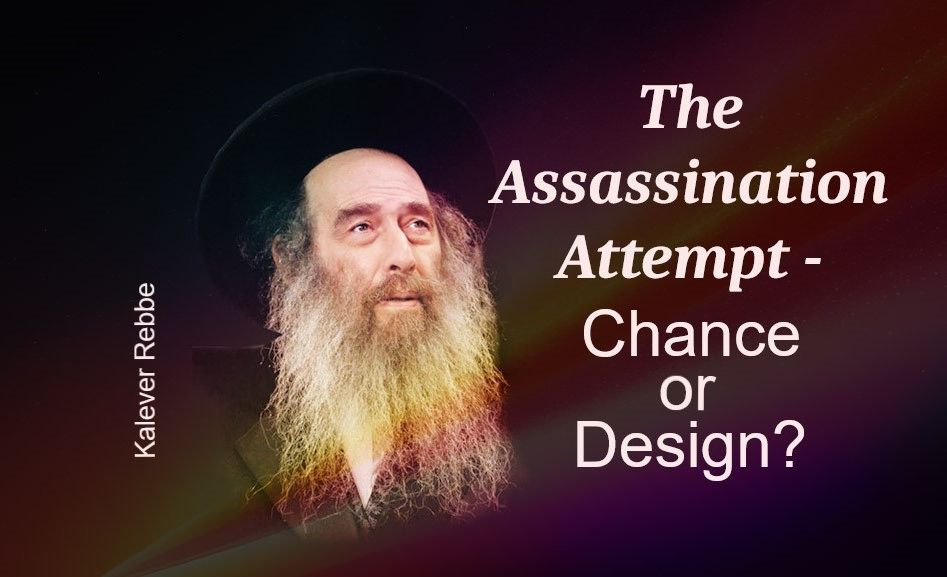
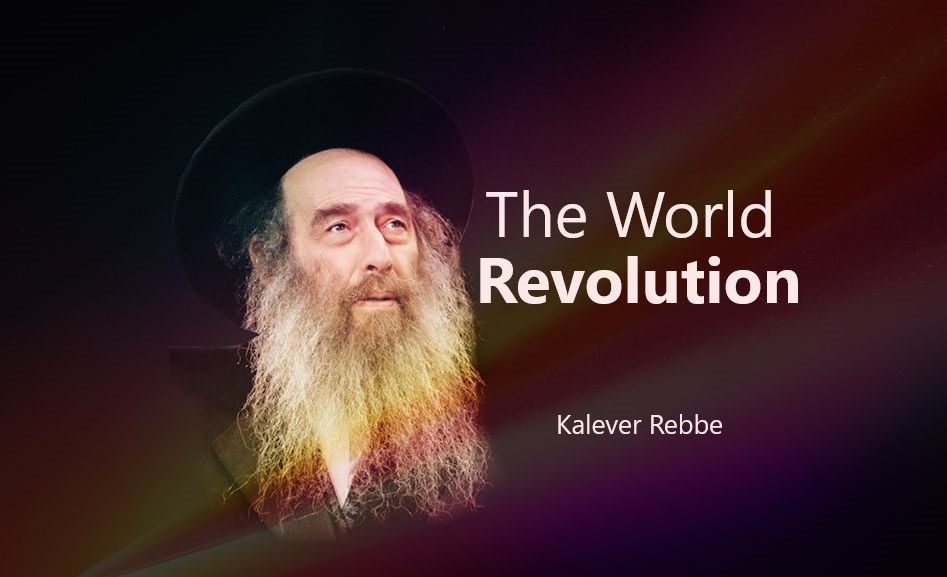
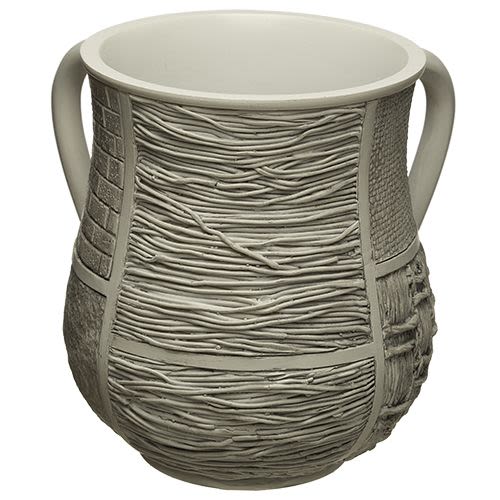
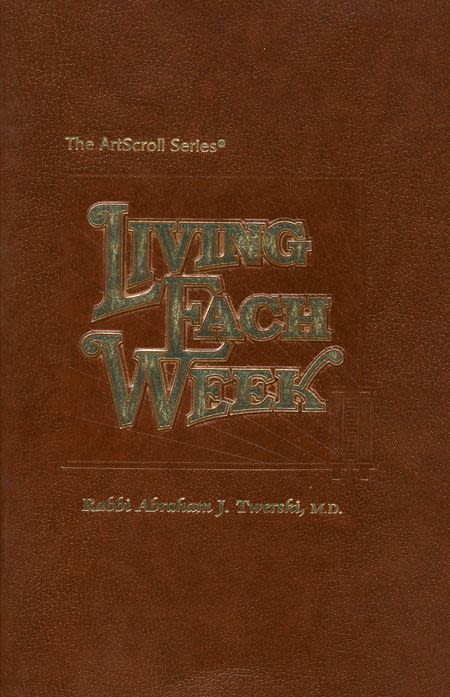
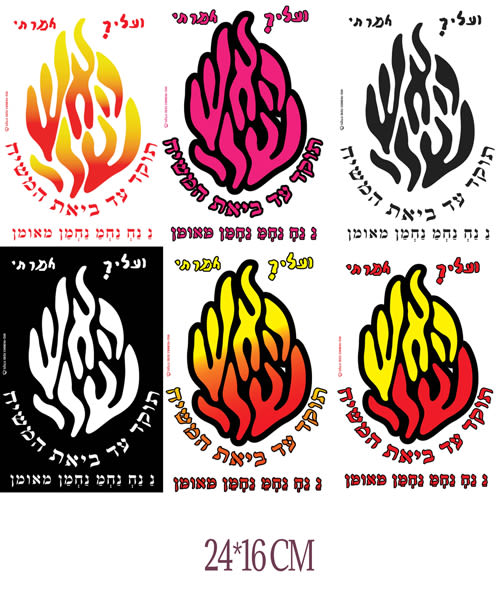
3/12/2024
This really resonated with me. Especially since my immediate family isn’t shomer-shabbat and I haven’t yet been able to influence them to do this and other important mitzvoth. I like the idea that by saying in the name of all yisroel my family can have a share in my mitzvoth.